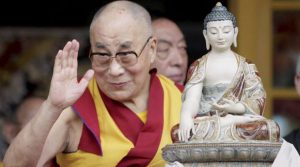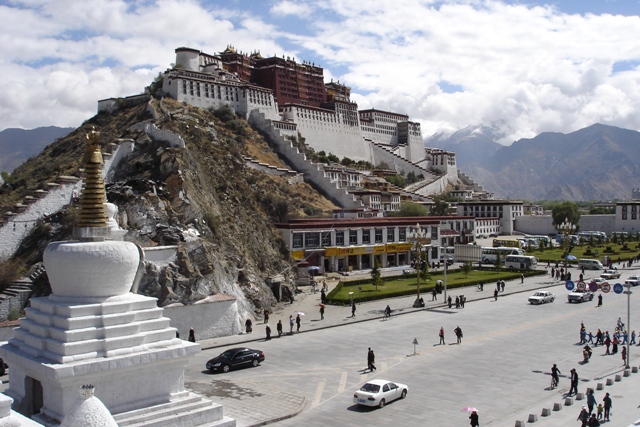Dharamsala: As US Secretary of State Antony Blinken embarks on a visit to China this weekend, the Tibetan exile administration places hopes on history and it also urges him to push for a Tibet-China dialogue in Beijing.
With China showing no compromise and as the Dalai Lama ages, the Tibetan administration, based in this north Indian hill station in Himachal Pradesh, is looking to history as His Holiness plans for the future.
Strongly advocating the cause, vocal activist for Tibet Richard Gere’s advocacy International Campaign for Tibet has called on Blinken to substantively raise the Tibetan issue with Chinese leaders, including by pushing them to resume dialogue with the envoys of 87-year-old Dalai Lama — the globally recognisable face of Tibet.
The State Department announced on Wednesday that Blinken will visit the China and the UK from June 16-21.
Blinken’s last attempt to visit China was derailed by an alleged Chinese spy balloon.
Under the Tibetan Policy Act, the Secretary is obligated to act on US support for Tibet, which the Chinese government has illegally occupied for over 60 years.
Blinken’s visit coincides with Wednesday’s concluded high-level visit of the USAID, led by Deputy Administrator for Policy and Programming Isobel Coleman, to this hill station after holding parleys with the Central Tibetan Administration, or CTA, leadership comprising Penpa Tsering, who was elected democratically in 2021 as the second-ever leader, or sikyong, of the government-in-exile.
His Holiness the 14th Dalai Lama also had an audience with the USAID delegation.
Since 2012, the USAID has intensified its partnership with the CTA to help deliver essential services to Tibetan communities in India and Nepal.
Despite being scattered across the globe, Tibetans, under the guidance of His Holiness, have perfected, advanced, and importantly preserved their democracy over the decades.
A joint letter to Blinken by 42 nongovernmental organisations that report on and advocate for human rights in China, Hong Kong, Tibet, and Xinjiang says at a time when the Chinese government is committing widespread and grave human rights violations both inside and outside China, “it is crucial for you to use the opportunity of your visit to inform your counterparts that the US intends to work alongside other concerned governments to seek accountability for Chinese government abuses”.

The Dalai Lama, who along with many of his supporters fled the Himalayan homeland and took refuge in India when Chinese troops moved in and took control of Lhasa in 1959, views himself as a simple Buddhist monk.
He believes in “middle-way” approach, meaning greater autonomy for Tibet rather than outright independence.
In March CTA President Tsering testified virtually at the US Congressional-Executive Commission on China’s hearing, highlighting small and large-scale repression that is deliberately intended to annihilate the foundation of Tibetan culture and national identity.
At the hearing, US Special Coordinator for Tibetan Issues Uzra Zeya has also delivered a video message raising concerns over China’s continued repressions inside Tibet, such as the enforcement of colonial-style boarding school system and involuntary mass DNA collection campaigns endangering the unique Tibetan identity.
Zeya in May 2022 had an audience with the Dalai Lama at his official residence in McLeodganj. His Holiness said despite China’s efforts, it has failed to change Tibetan mind.
The American people have also long expressed consistent, bipartisan support for Tibetans and the Dalai Lama.
Researchers and Tibet watchers believe Secretary Blinken during his visit must raise the need to resume dialogue between envoys of the Dalai Lama and the Chinese government. These talks have been deadlocked since 2010 due to the lack of political will on the part of the Chinese leadership.
The length of time since the previous round of negotiations and the Dalai Lamaa”s advancing age underscore the need for a concrete initiative by the US while His Holiness is active and can help ensure a peaceful resolution to the Tibet-China conflict, says the International Campaign for Tibet.
During his trip, Secretary Blinken could also take up other issues related to Tibet.
Just recently, Blinken told Freedom House, which this year ranked Tibet the least-free country on earth alongside South Sudan and Syria, that the State Department was “concerned by reports of the spread of mass DNA collection to Tibet as an additional form of control and surveillance over the Tibetan population”.
According to the International Campaign for Tibet, Blinken should raise those concerns with Chinese leaders during his trip.
In addition, Blinken should reiterate and follow up on the United States’ position on the issue of the reincarnation of Tibetan Buddhist leaders, especially the US policy that only the current Dalai Lama and Tibetan Buddhists have the authority to decide on his succession.
Blinken should also elevate the need to end China’s forced isolation of Tibet and also include Tibetan political prisoners on his agenda and call for their release during his discussions in Beijing.
According to the vision paper aSecuring Tibet’s Future’ released by the CTA in April Tibetans face an existential threat to their culture and identity due to the repressive genocidal policies of China.
“Even though the Kashag (Cabinet) wishes to resume contact with the Chinese government, it depends on whether the Chinese leadership has the political will to resolve the conflict,” it says.
“If the Chinese side sincerely proposes dialogue to find a lasting solution to the conflict, we stand ready to respond. Until such a solution is found, we will meticulously examine the situation inside Tibet and point out the wrong policies that need to be stopped or rectified.”
The recognition of Tibet as an independent nation, as proven by historians, is a prerequisite for according leverage and value to the “middle-way policy”.
“Therefore, it is important to accept the fact that Tibet is currently an occupied nation. It is important for all stakeholders to recognise Tibetans not just as mere victims of the PRC but as partners in bringing about positive changes in China,” says the vision paper.
In the 1990s, the Dalai Lama, who devolved all his political and administrative responsibilities to the democratically-elected leadership in 2011, reached out to the Tibetan people to decide on the future course of the Tibetan movement.
A seasoned journalist with over two decades of experience, Vishal writes on a wide range of subjects which include biodiversity, climate change and links between environment & development. He also covers politics and other developments in Punjab and Himachal Pradesh. He lives in Chandigarh & Shimla.



